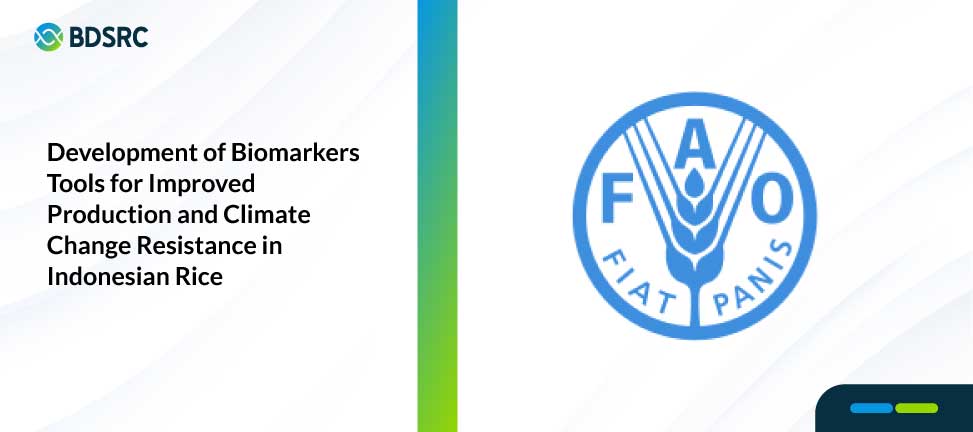Development of Biomarkers Tools for Improved Production and Climate Change Resistance in Indonesian Rice

Context of the project:
Rise in average global temperature and increasingly frequent and prolonged episodes of extreme areal floods and dry spells affect rice crop yield negatively. As one of the biggest producers and consumers of rice, Indonesia’s food security is threatened by these climate change impacts. A counteract to this challenge is to develop resilient rice varieties that can withstand adverse climate conditions and have improved production qualities.
Marker-assisted selection (MAS) is a molecular breeding strategy using DNA markers to develop plant varieties with desirable traits, such as disease resistance and yield improvements under any conditions. However, the volume and complexity of collected data requires a molecular breeding toolkit to accelerate and optimize the process of linking genetic variation in rice to important traits. To assist this aspect of rice breeding, this project focuses on designing a rice biomarkers development toolkit using state-of-the-art bioinformatics and statistical methodologies.
Description of the most relevant activities and outputs:
Bioinformatics and Data Science Research Center (BDSCR) of Bina Nusantara University (Jakarta, Indonesia) leads the project, provides information technology support, and is responsible for project logistics. The Indonesian Center for Agricultural Biotechnology and Genetic Resources, Indonesian Agency for Agriculture Research and Development, and Ministry of Agriculture (Bogor, Indonesia) provides genomic and phenotypic data, reviews results, performs follow-up experiments, and assists in result dissemination to relevant parties. BDSCR and their network of collaborators will provide state-of-the-art statistical modeling expertise and software for this project.
- Integration of genotypes, trait, heredity, stress, and climate data for a diverse set of rice planted in various locations with distinct climate conditions across multiple seasons in a relational database and the linking of these data to other resources;
- Performance of genome-wide and genome-environment-wide (GxE) analyses of complex traits in a diversity panel of rice varieties using appropriate generalized linear modeling;
- Development and utilization of statistical methodologies to assess systematically the relationships among numerous factors (e.g. genetic, ancestry, climatic, soil) within relevant abiotic biological pathways;
- Combination of evidences from independent datasets and consortia, and evaluation of replicable and predictive properties of promising models;
- Final report development for result dissemination.
Description of the target beneficiaries:
Approximately 30 major rice breeders may benefit directly from this project in Indonesia alone, by having the ability to conduct trials and marker-assisted selection based on biomarkers the tool uncovers. The toolkit enables basic scientists to study genetic influences on desirable phenotypes found in Indonesian rice varieties. Through International Rice Research Institute meetings and high-impact publications, over 2,500 scientists can benefit indirectly. Statistical framework accounting for genetic and environmental factors has general applicability for improving other Southeast Asia treaty countries’ rice varieties. The toolkit can also serve as a model for agrogenomics research on other plant crops’ supply security.
Impact/expected benefits/positive changes in the communities’ livelihoods:
Improving yield and decreasing the likelihood of failed crops through molecular breeding programs will lead to more affordable rice, thus helping poorer communities. This begins with identifying genetic markers related to production traits will help breeders develop rice varieties with improved yield, quality, and sustainability via molecular breeding methods. Breeding programs based on biomarkers will ultimately increase the availability of rice seeds with superior qualities to farmers, leading to the protection of rice supply security for the general population. The toolkit designed by this project will accelerate the identification process through accurate and reliable genetic markers for selecting rice traits that improve durability.
The biomarkers uncovered may help produce rice breeds with improved traits that government agricultural agencies can distribute. Consequently, farmers will have more incentive to take advantage of the subsidy that comes with purchasing government agencies’ rice seeds. Currently, 60-70% of Indonesian rice farmers opt to spend significant amount of time, money, and resources into maintaining their own rice cultivars since government-supplied seeds are of poor quality. Government subsidy, improved rice seed quality, and more efficient allocation of resources would lower farmers’ rice production cost, thereby reducing the price of rice sold to the general public.
